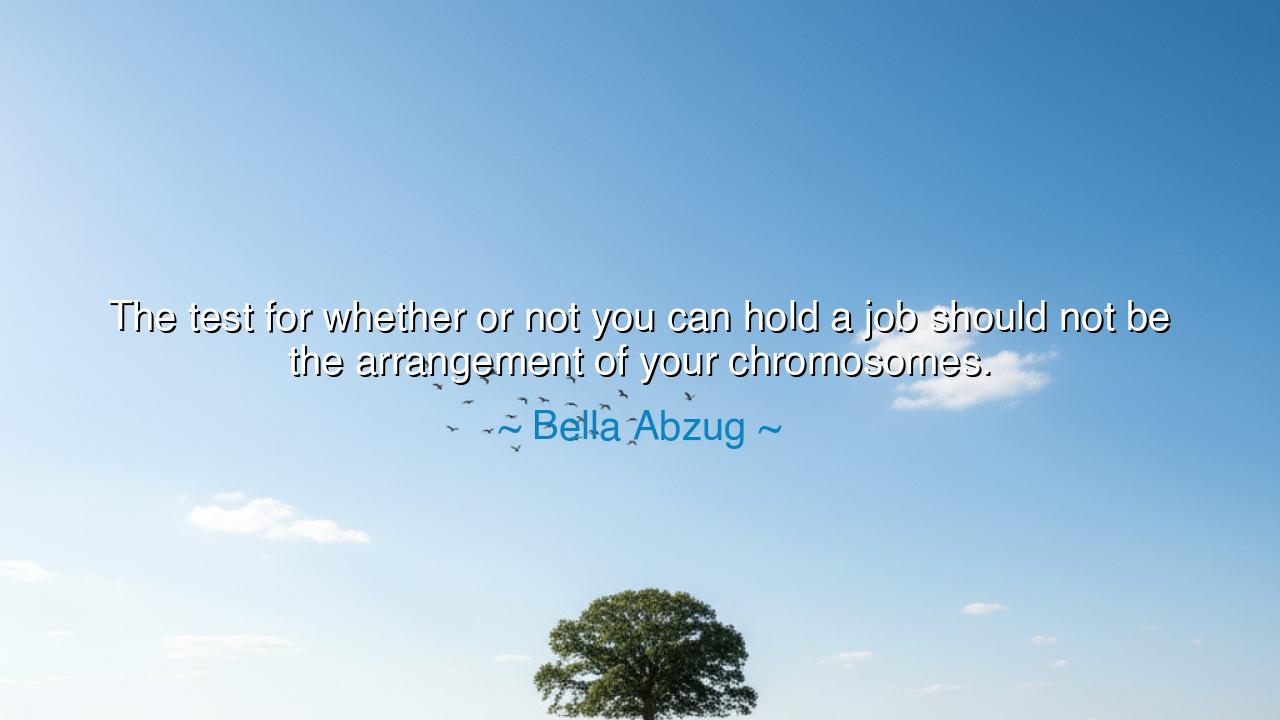
The test for whether or not you can hold a job should not be the
The test for whether or not you can hold a job should not be the arrangement of your chromosomes.






The bold voice of Bella Abzug, warrior for justice and fierce defender of women’s rights, proclaimed with unshakable clarity: “The test for whether or not you can hold a job should not be the arrangement of your chromosomes.” These words tear through the veil of prejudice and expose the absurdity of measuring a soul’s worth by biology alone. In her time, as in centuries before, women were too often denied positions of power, dignity, or skill, not because of their abilities, but because of the chromosomes that marked them as female. Abzug’s cry was not only for women, but for all humanity, that no one’s future should be chained by the accidents of birth.
Her declaration arises from a long lineage of struggle. In every age, societies have built walls around opportunity, telling some they are fit to labor and lead, while others must remain silent, confined, invisible. For millennia, men justified these barriers with laws, customs, and even divine decrees. But Abzug shattered such illusions, reminding us that the true measure of ability lies not in anatomy, but in courage, skill, and vision. Work, she insisted, belongs to those who can perform it, not to those whom tradition favors.
History gives us radiant examples. Consider the story of Rosalind Franklin, the brilliant scientist whose research was crucial to discovering the structure of DNA. Though her work illuminated the very secret of chromosomes, she was pushed aside, her contributions diminished in favor of her male colleagues. Her genius was undeniable, yet the prejudice of her era muted her recognition. What irony that the woman who revealed the shape of the double helix itself was judged not by her work, but by her gender. Franklin’s life proves Abzug’s wisdom: when society judges by chromosomes, it blinds itself to greatness.
The meaning of Abzug’s words reaches beyond gender alone. For chromosomes, in their varied arrangements, remind us of all who live outside the narrow boxes of society’s approval—those whose identities, appearances, or differences have been deemed “unfit.” Her teaching is universal: never let the biology of a person be the chain that bars them from labor, dignity, or destiny. To do so is to shrink the human spirit and rob the world of the gifts hidden in unexpected vessels.
But let us also hear the deeper challenge. Abzug calls us not only to abandon prejudice, but to reimagine the workplace itself as a place where fairness reigns. Equality is not merely the absence of discrimination—it is the presence of justice. It requires vigilance, revision, and courage, for old biases creep back in new disguises. To honor her words, we must not only open the door for women and the marginalized; we must ensure the environment beyond that door is one where they may flourish freely.
The lesson is plain for every generation: if you would build a just society, measure each person by their ability, not their biology; by their character, not their chromosomes. When you hire, when you lead, when you judge, look to the work of their hands and the strength of their spirit, not the labels the world has pressed upon them. For in every soul lies untapped potential, waiting only for the chance to be seen and recognized.
Practical wisdom flows from this truth: challenge bias wherever you see it—whether in your workplace, your family, or your own heart. Support policies that ensure fairness, and honor those who break barriers by amplifying their voices. Teach your children that worth is not decided by birth, but by the labor of love, creativity, and courage. And above all, carry forward Abzug’s cry, for though much has been won, the struggle for equality remains.
Thus, let her words endure as a torch passed down through time: chromosomes do not define destiny. Talent, wisdom, and perseverance belong to no gender, no genetic code, but to the human spirit itself. And until we build a world that recognizes this truth, the work of justice is not yet finished.






AAdministratorAdministrator
Welcome, honored guests. Please leave a comment, we will respond soon